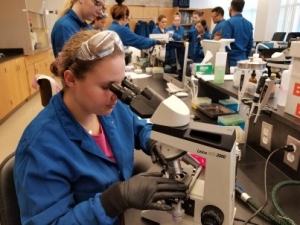Make Learning Immediately Relevant with Scenarios
One way to engage learners is to make content immediately relevant. People naturally pay more attention to information they can use right away than information they “might need someday.”
One way to engage learners is to make content immediately relevant. People naturally pay more attention to information they can use right away than information they “might need someday.”
The proportion of college instructors who are teaching online and blended courses is growing. So is their support for using technology to deliver instruction. But their belief in the quality and effectiveness of online courses and digital technology isn’t keeping pace. Those are among the findings — conflicting and confounding, as is often the case — of Inside Higher Ed’s 2018 Survey of Faculty Attitudes on Technology, published today in partnership with Gallup.
– National Center for Biological Information
Results from end-of-course student evaluations of teaching (SETs) are taken seriously by faculties and form part of a decision base for the recruitment of academic staff, the distribution of funds and changes to curricula. However, there is some doubt as to whether these evaluation instruments accurately measure the quality of course content, teaching and knowledge transfer. This paper investigated whether the provision of chocolate cookies as a content-unrelated intervention influences SET results.
Discipline-based education researchers have a natural laboratory—classrooms, programs, colleges, and universities. Studies that administer treatments to multiple sections, in multiple years, or at multiple institutions are particularly compelling for two reasons: first, the sample sizes increase, and second, the implementation of the treatments can be intentionally designed and carefully monitored, potentially negating the need for additional control variables. However, when studies are implemented in this way, the observations on students are not completely independent; rather, students are clustered in sections, terms, years, or other factors.
Introducing group work in college science classrooms can lead to noticeable gains in student achievement, reasoning ability, and motivation. To realize these gains, students must all contribute. Strategies like assigning roles, group contracts, anonymous peer evaluations, and peer ratings all encourage student participation. In a class using these strategies, we conducted in-depth interviews to uncover student perceptions of group work in general and the utility of these support strategies.

By adopting JoVE Science Education videos for her laboratory course, a Northeastern University biology instructor saves significant time and effort in class and during lesson preparations.

This article contributes to a more robust understanding of timely completion of STEM doctorates by underrepresented minority students. Findings indicate that Hispanic/Latino and students from other underrepresented groups complete at higher rates than do their Black/African American counterparts. The authors of this article offer insights and recommendations for graduate schools about how to increase the STEM doctoral attainment rate of students from underrepresented groups.
The strongest liberal arts education would include basic business skills, opportunities for internships, and interaction with business leaders, such as alumni—exactly what is taking place in the independent college sector today.
Here are things to consider in science teaching to make meaningful connections to the cultural knowledge, experiences, and ways of knowing of students and their communities.
A new study estimates that it will take 16 years for women and men to publish papers in equal numbers. For physics, it will take 258 years.
